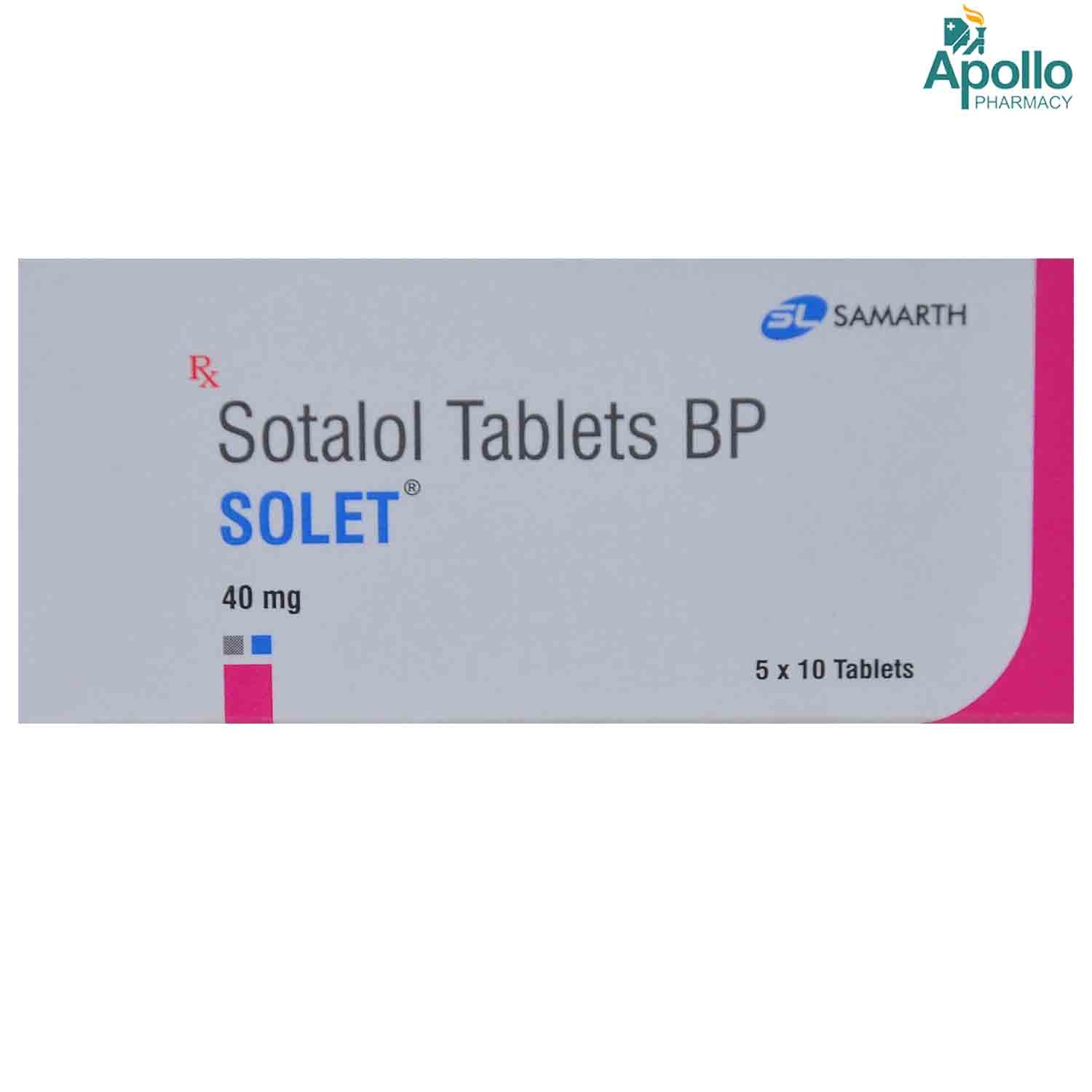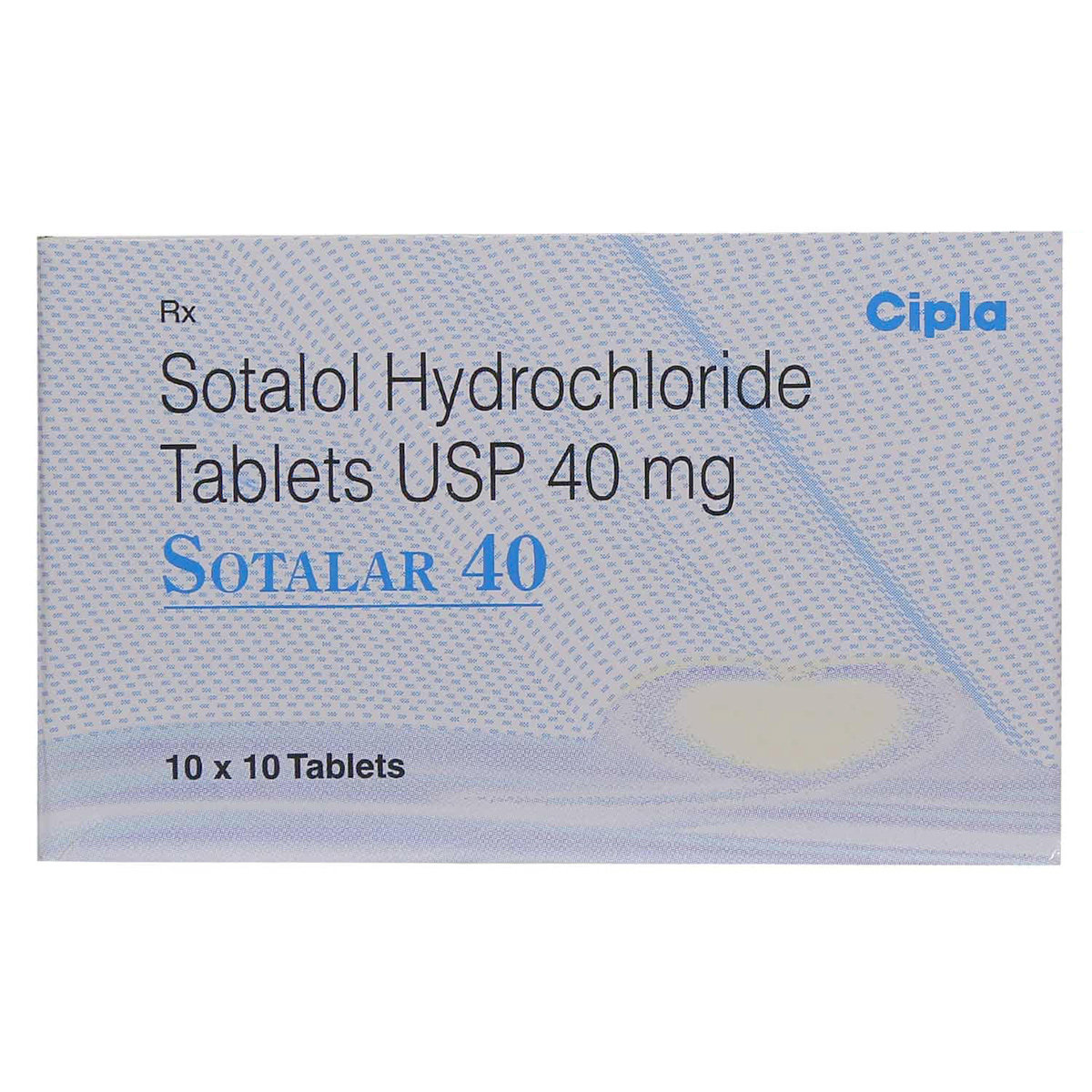Sotalol
About Sotalol
Sotalol belongs to a group of medications known as 'anti-arrhythmia' drugs, used to treat arrhythmia (irregular heartbeat) or any other heart condition associated with an irregular heartbeat such as fibrillation (irregular heartbeat)and tachycardia (too fast heartbeat). Arrhythmia is a problem associated with the rate of rhythm at which the heart beats.
Sotalol contains Sotalol, a beta-blocker primarily used to treat an irregular heartbeat. It works by blocking abnormal electrical signals in the heart, which helps control the heart's uneven beating and normal beat in conditions such as atrial or ventricular fibrillation (a rapid contraction of heart muscle), atrial flutter (pounding or racing heartbeat), tachycardia (heavy heartbeat more than 100 beats/min). So, it effectively helps to treat problems associated with an irregular heartbeat by
Sotalol should be taken as prescribed by your doctor. It can be taken with or without food. You are advised to take Sotalol for as long as your doctor has prescribed it for you, depending upon your medical condition. In some cases, this medicine may cause side effects such as fatigue, slow heart rate, dizziness, weakness, and breathlessness. Most of these side effects of Sotalol do not require medical attention and gradually resolve over time. However, if the side effects are persistent, reach out to your doctor.
Sotalol should be avoided if allergic to it or other components of the formulation. Inform your doctor if you are pregnant or are planning to get pregnant, are breastfeeding, have liver disease, kidney disease, thyroid problem, heart failure, a heart valve problem, or have a history of a heart attack. Regular monitoring of blood pressure and heart rate is needed while taking Sotalol. Certain medicines like depression and mental illness medicines should be avoided while taking Sotalol.Do not abruptly stop taking Sotalol as it may lead to withdrawal symptoms like an irregular heartbeat, which can be really fatal.
Uses of Sotalol
Medicinal Benefits
Sotalol belongs to a group of medications known as 'anti-arrhythmia' drugs, containing Sotalol, primarily used to treat arrhythmia (irregular heartbeat) or any other heart condition associated with an irregular heartbeat such as fibrillation and tachycardia. It works by blocking abnormal electrical signals in the heart, which helps control the heart's uneven beating and helps to beat normally. So. it effectively helps to treat problems associated with an irregular heartbeat.
Directions for Use
Storage
Side Effects of Sotalol
- Fatigue
- Slow heart rate
- Dizziness
- Weakness
- Breathlessness
Drug Warnings
- Inform your doctor if you have had an allergic reaction to Sotalol, are pregnant or are planning to get pregnant, are breastfeeding, have liver disease, kidney disease, untreated phaeochromocytoma (vascular tumor of adrenal medulla), thyroid problem, heart failure, a heart valve problem, or history of a heart attack.
- Tell your doctor about all the prescription and over-the-counter medications you use, including vitamins, minerals, herbal products and drugs prescribed by other doctors.
- You must closely monitor your blood pressure and heart rate while taking Sotalol.
- Do not start using a new medication without telling your doctor.
- Lifestyle changes are beneficial in achieving optimum outcomes with Sotalol and keeping blood pressure under check.
- Do not abruptly stop taking Sotalol as it may lead to withdrawal symptoms like an irregular heartbeat which can be really fatal.
Drug Interactions
Drug-Disease Interaction: Sotalol is known to interact in patients with hypotension (low blood pressure), heart disease, kidney or liver disease, hyperthyroidism, Raynaud's disease (a blood circulation problem), asthma, severe diarrhoea.
Drug-Food Interaction: Alcohol should be avoided while taking Sotalol.
Drug-Drug Interaction: Sotalol is known to interact with drugs used for the treatment of high blood pressure (digoxin, amiodarone, verapamil, disopyramide, quinidine, procainamide), heart failure (verapamil, diltiazem), depression (lithium), epilepsy (phenytoin, phenobarbital), allergy (astemizole, terfenadine), antibiotics (erythromycin), malaria (halofantrine), microbial infections (pentamidine), diabetes (insulin), asthma (salbutamol), anxiety (methyldopa).
Drug-Drug Interactions Checker List:
Safety Advice

Alcohol
cautionAlcohol intake can increase the blood pressure-lowering effect of Sotalol, making you feel dizzy or light-headed. Therefore avoid alcohol while on treatment with Sotalol.

Pregnancy
cautionSotalol is a category C pregnancy medicines. It is not known whether it harms the baby or not. So, it should be taken only if a doctor prescribes you.

Breast Feeding
cautionSotalol is known to pass through the breast milk. So, breastfeeding women should not take Sotalol.

Driving
unsafeSotalol has no or negligible effect on driving and machine operation. However, it should be noted that occasionally dizziness or fatigue may occur.

Liver
cautionLet your doctor know if you have any history of liver diseases before using Sotalol. Your doctor will weigh the benefits and any potential risks before prescribing it to you.

Kidney
cautionLet your doctor know if you have any history of kidney diseases before using Sotalol. Your doctor will weigh the benefits and any potential risks before prescribing it to you.

Children
cautionSotalol is not recommended for children below 12 years of age as the safety and efficacy of this medicine are not established.
Habit Forming
Diet & Lifestyle Advise
- Keep your weight under control with BMI 19.5-24.9.
- Opt for a diet rich in whole grains, fruits, veggies, and low-fat dairy products.
- Limit intake of sodium chloride (table salt) in your daily diet to 2300 mg per day or less than 1500 mg is ideal for most adults.
- If you are taking alcohol then only one serving for women and two servings for men is advisable.
- Quitting smoking is the best strategy to lower the risk of heart disease.
- Avoid chronic stress as it can raise your blood pressure. Try to enjoy and spent time with your loved ones to cope with stress and practice mindfulness techniques.
- Monitor your blood pressure daily and if there is too much fluctuation then immediately contact your doctor.
- Try to include heart-healthy omega 3 fatty acid containing food drinks in your daily diet. You can also use low-fat cooking oil like olive oil, soybean oil, canola oil, and coconut oil can help in lowering your elevated blood pressure.
Special Advise
- You should get regular blood tests done to monitor your sodium and potassium level, blood sugar level, kidney function, and lung function.
Patients Concern
Disease/Condition Glossary
Arrhythmia: Arrhythmia is a condition associated with the rate of rhythm at which the heart beats. Generally, in this condition, the heart beats either too fast, too slow, or irregularly, which can lead to severe heart damage. A cardiac arrhythmia occurs when there are abnormal electrical signals in the heart. When the heart beats too fast, it is known as tachycardia; if it is too slow, it is called bradycardia. Treatment of arrhythmia includes drugs, medical procedures, implantable devices and sometimes surgery.
FAQs
Sotalol contains Sotalol that works by blocking abnormal electrical signals in the heart, which helps control the uneven beating of the heart and helps to beat normally.
Taking Sotalol can lead to blurred vision or you may see a circle around dazzling light (halos). It may also make your eyes dry or sensitive to light. If these symptoms are left untreated, it may lead to permanent blindness. Therefore, consult your doctor in case you experience any such problems while taking Sotalol.
Do not abruptly stop taking Sotalol as it may lead to withdrawal symptoms like an irregular heartbeat, which can be really fatal. Consult your doctor, and if he thinks your condition is improving, the dose will be lowered accordingly.
Sotalol may lead to liver toxicity in some cases. The signs to toxicity include jaundice (yellowing of the skin or eyes), pale-colored stools, tiredness, nausea, vomiting, dark-colored urine, stomach pain. Immediately inform your doctor if you experience these symptoms.
Sotalol is known to cause fluctuations in sugar level. So, if a patient has diabetes, Sotalol should be taken with caution and regular monitoring of blood sugar level is required.




